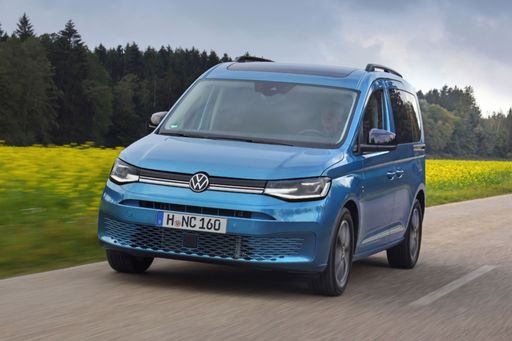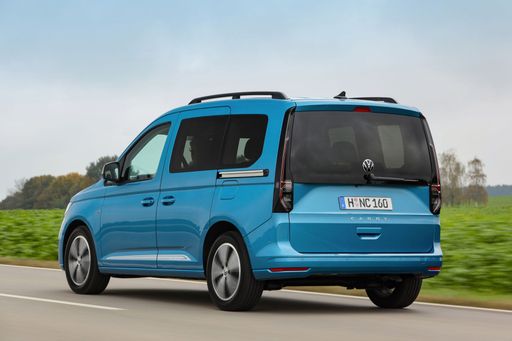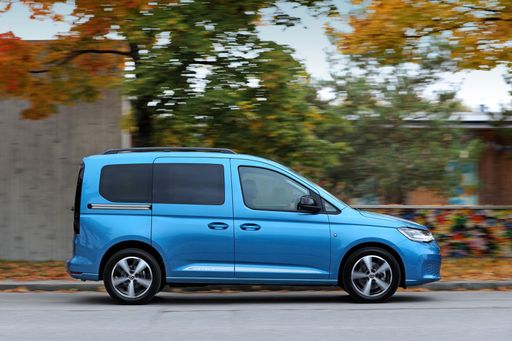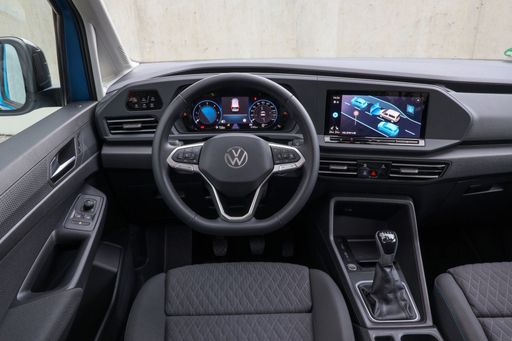Renault Trafic Bus vs VW Caddy Compact Van – Differences & prices compared
Compare performance, boot space, consumption and price in one view.
Find out now: which car is the better choice for you – Renault Trafic Bus or VW Caddy Compact Van?
The Renault Trafic Bus (Bus) comes with a Diesel engine and Manuel transmission. In comparison, the VW Caddy Compact Van (Cargo Van) features a Petrol, Diesel or Plugin Hybrid engine with Manuel or Automatic transmission.
When it comes to boot capacity, the Renault Trafic Bus offers , while the VW Caddy Compact Van provides – depending on how much space you need. If you’re looking for more power, decide whether the 150 HP of the Renault Trafic Bus or the 150 HP of the VW Caddy Compact Van suits your needs better.
In terms of consumption, the values are 6.80 L per 100 km for the Renault Trafic Bus, and 0.50 L for the VW Caddy Compact Van.
Price-wise, the Renault Trafic Bus starts at 38200 £, while the VW Caddy Compact Van is available from 25800 £. Compare all the details and find out which model fits your lifestyle best!
Renault Trafic Bus
The Renault Trafic Bus is a versatile and spacious option for those needing to transport multiple passengers comfortably. With its modern design and practical features, it is well-suited for both business and leisure purposes. Its efficient engine and smooth handling make it a reliable choice for long journeys.
detailsVW Caddy Compact Van
The VW Caddy small van is a versatile option for those seeking a practical and efficient transporter. With its sleek design and innovative features, it caters well to both business needs and everyday convenience. The interior is thoughtfully designed, offering comfort and ample space for cargo or passengers, making it a reliable choice for various tasks.
details @ vwpress
@ vwpress
 @ vwpress
@ vwpress
 @ vwpress
@ vwpress
 @ vwpress
@ vwpress

|
|
|
|
|
Costs and Consumption |
|
|---|---|
|
Price
38200 - 51100 £
|
Price
25800 - 42300 £
|
|
Consumption L/100km
6.8 - 7.2 L
|
Consumption L/100km
0.5 - 6.8 L
|
|
Consumption kWh/100km
-
|
Consumption kWh/100km
-
|
|
Electric Range
-
|
Electric Range
117 - 120 km
|
|
Battery Capacity
-
|
Battery Capacity
19.70 kWh
|
|
co2
179 - 188 g/km
|
co2
11 - 154 g/km
|
|
Fuel tank capacity
80 L
|
Fuel tank capacity
50 L
|
Dimensions and Body |
|
|---|---|
|
Body Type
Bus
|
Body Type
Cargo Van
|
|
Seats
8 - 9
|
Seats
2
|
|
Doors
4
|
Doors
4 - 5
|
|
Curb weight
2031 - 2321 kg
|
Curb weight
1442 - 1818 kg
|
|
Trunk capacity
-
|
Trunk capacity
-
|
|
Length
5080 - 5480 mm
|
Length
4500 - 4853 mm
|
|
Width
1956 mm
|
Width
1855 mm
|
|
Height
1973 - 1974 mm
|
Height
1819 - 1823 mm
|
|
Payload
749 - 982 kg
|
Payload
628 - 759 kg
|
Engine and Performance |
|
|---|---|
|
Engine Type
Diesel
|
Engine Type
Petrol, Diesel, Plugin Hybrid
|
|
Transmission
Manuel
|
Transmission
Manuel, Automatic
|
|
Transmission Detail
Manual Gearbox
|
Transmission Detail
Manual Gearbox, Dual-Clutch Automatic
|
|
Drive Type
Front-Wheel Drive
|
Drive Type
Front-Wheel Drive, All-Wheel Drive
|
|
Power HP
110 - 150 HP
|
Power HP
102 - 150 HP
|
|
Acceleration 0-100km/h
13.6 - 16.5 s
|
Acceleration 0-100km/h
-
|
|
Max Speed
161 - 174 km/h
|
Max Speed
175 - 186 km/h
|
|
Torque
300 - 350 Nm
|
Torque
220 - 320 Nm
|
|
Number of Cylinders
4
|
Number of Cylinders
4
|
|
Power kW
81 - 110 kW
|
Power kW
75 - 110 kW
|
|
Engine capacity
1997 cm3
|
Engine capacity
1498 - 1968 cm3
|
General |
|
|---|---|
|
Model Year
2023 - 2024
|
Model Year
2024
|
|
CO2 Efficiency Class
G
|
CO2 Efficiency Class
E, B
|
|
Brand
Renault
|
Brand
VW
|
Renault Trafic Bus
A Glimpse into the Renault Trafic Bus: An Icon of Versatility and Innovation
Amongst the plethora of vans designed for both business and leisure, the Renault Trafic Bus stands out as an exemplar of functionality, innovation, and style. Let's delve into what makes the Renault Trafic Bus a popular choice in the UK and across Europe, particularly focusing on its technical specifications and state-of-the-art features.
Performance Dynamics: Power Under the Hood
The Renault Trafic Bus, a staple in Renault's fleet, is driven by a robust diesel engine configuration with power outputs ranging from 110 PS to a formidable 170 PS. The diesel engines combine efficiency and power, offering torque figures between 300 to 380 Nm, ensuring smooth power delivery and capable load hauling.
Drivers can choose between manual and automatic transmissions, both designed to complement the Trafic's front-wheel-drive system. This flexibility ensures that drivers experience enhanced driving comfort whether they are navigating urban roads or cruising on the motorway.
Efficiency Meets Economy
The Trafic Bus showcases impressive fuel economy with consumption figures ranging from 6.8 to 7.2 litres per 100 kilometres. This efficiency is crucial for businesses aiming to minimise operational costs and for families seeking budget-friendly travel options.
With a generous fuel tank capacity of 80 litres, the Renault Trafic Bus is built to cover long distances with fewer fuel stops, making it an ideal choice for long haul journeys.
Technological Innovations and Comfort
The Trafic Bus isn't just about robust performance. Renault has integrated a suite of technological innovations designed to enhance driver and passenger comfort. Its cabins are equipped with the latest infotainment systems and safety technologies, providing an optimal blend of comfort and convenience.
The various trims, such as Life, Start, Spaceclass, and their respective EDC variants, cater to different needs and preferences, ensuring that customers can find the perfect configuration for their requirements.
Design and Dimensions: Space for Every Purpose
Space and versatility are at the heart of the Trafic Bus design. With its dimensions ranging from a length of 5080 to 5480 mm, and a width of 1956 mm, this vehicle offers ample room for passengers and cargo alike. The height stands between 1973 and 1974 mm, ensuring that even taller individuals can travel comfortably.
With seating for up to eight people and a payload capacity between 730 to 1010 kg, the Trafic Bus can transform seamlessly between a people-mover and a goods carrier.
Environmental Considerations
Renault has engineered the Trafic Bus with environmental responsibility in mind. The CO2 emissions range from 178 to 190 g/km, which, while modest for its class, aligns with the efficiency and performance goals set for this versatile vehicle. The CO2 efficiency class is rated as 'G', offering transparency in its environmental impact profile.
Conclusion: A Leader in Its Class
The Renault Trafic Bus continues to lead its segment through a blend of power, efficiency, and technological advancements. Whether it's for commercial transport or family adventures, the Trafic offers a reliable and adaptable solution, setting a high standard for multi-purpose vehicles.
For those seeking a distinguished blend of utility and comfort, the Renault Trafic Bus emerges as an exceptional choice, promising performance and innovation on every journey.
VW Caddy Compact Van
Compact Versatility: A Closer Look at the VW Caddy Compact Van
The VW Caddy Compact Van has long been a staple in the commercial vehicle sector, offering a versatile and robust solution for professionals and businesses alike. Combining impressive technical capabilities with innovative features, the latest iteration of the Caddy Compact Van continues to uphold its legacy as a dependable and efficient vehicle.
Engine Performance and Efficiency
At the heart of the VW Caddy Compact Van lies an efficient and powerful engine range designed to meet varying performance needs. The van comes with several engine options, including economical yet robust diesel engines and responsive petrol variants. These engines have been engineered to optimize fuel efficiency without compromising on power, making the van a cost-effective option for urban deliveries and long highway journeys alike.
Innovative Design and Practicality
The VW Caddy Compact Van features a meticulously crafted design that focuses on practicality and space utilization. Its compact dimensions are perfect for navigating busy city streets, while the interior offers a surprisingly spacious cargo area. This innovative design ensures that every inch of space is used effectively, maximizing cargo capacity without affecting driver and passenger comfort.
Advanced Technology for Modern Needs
Embracing modern technology, the VW Caddy Compact Van is equipped with a host of intelligent systems aimed at enhancing safety and convenience. The van features advanced driver-assistance systems, including adaptive cruise control, park assist, and a rear-view camera. These features contribute to a safer driving experience, whether maneuvering through narrow city streets or handling larger loads on the highway.
Comfort and Convenience Inside
Inside, the VW Caddy Compact Van presents a blend of comfort and practicality. The ergonomic design ensures that all controls are within easy reach, allowing the driver to focus on the road. Optional infotainment systems and connectivity features, such as smartphone integration and Bluetooth connectivity, provide a seamless driving experience, turning the Caddy into a mobile office on wheels.
Environmental Responsibility
In light of increasing environmental awareness, the VW Caddy Compact Van has been designed to minimize its ecological footprint. The efficient engine options produce low CO2 emissions while adhering to stringent environmental standards. This commitment to environmental responsibility makes the Caddy a smart choice for businesses looking to reduce their carbon footprint.
Conclusion: A Dependable Partner
In conclusion, the VW Caddy Compact Van remains a leader in its class, offering a dynamic combination of performance, efficiency, and practicality. Its innovative features and advanced technology cater to the diverse needs of modern businesses, ensuring the Caddy is not just a vehicle, but a reliable partner on the road. Whether used for transporting goods or as a mobile workshop, the VW Caddy Compact Van continues to deliver on its promise of versatility and dependability.
The prices and data displayed are estimates based on German list prices and may vary by country. This information is not legally binding.
